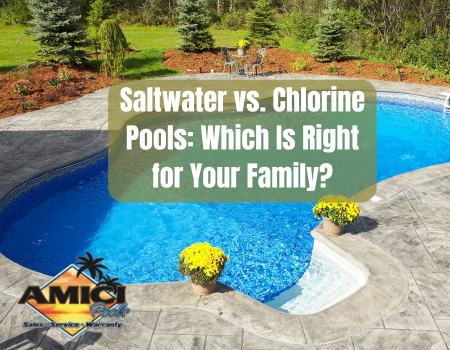When planning to build or upgrade a backyard pool, one of the most important decisions you’ll face is choosing between a saltwater or chlorine pool system. Both options offer their own benefits and drawbacks, and the best choice depends on your family’s needs, preferences, and how much time you want to spend on maintenance.
 How They Work
How They Work
At first glance, a saltwater pool might sound like swimming in the ocean, but that’s not quite the case. Saltwater pools rely on a salt chlorine generator, which transforms salt into chlorine to keep the water clean and sanitized. This system provides a milder, more consistent way to maintain proper chlorine levels.
In contrast, traditional chlorine pools need you to add chlorine manually, whether through tablets, granules, or liquid form. Chlorine is directly responsible for disinfecting the water and preventing algae, bacteria, and other harmful contaminants.
Maintenance
Saltwater pools are often praised for being easier to maintain on a day-to-day basis. The salt chlorine generator creates a steady level of chlorine, which means fewer chemical fluctuations and less manual work. However, the generator needs regular inspection, and over time, salt can be corrosive to certain pool components, requiring occasional equipment maintenance or replacements.
Chlorine pools need a bit more hands-on attention. You’ll have to regularly test and adjust chemical levels and add chlorine as needed. But the system is simpler, and repairs or part replacements are typically less expensive.
Verdict:
Saltwater pools require less frequent chemical handling, but chlorine pools are easier and cheaper to fix when issues arise.
Comfort and Swimming Experience
Saltwater is significantly more soothing for the skin, eyes, and hair. Many families with kids or people with sensitive skin prefer saltwater because it doesn’t leave behind the strong smell or harsh feeling often associated with chlorine. The water tends to feel softer and more pleasant.
Chlorine pools, while effective at sanitizing, can sometimes irritate the eyes and skin, especially if the chemical levels are off balance. They also tend to produce that familiar “pool smell,” which comes from chloramines—not the chlorine itself—but it can be unpleasant for some swimmers.
Verdict:
For a more comfortable swimming experience, especially for young children or sensitive skin, saltwater has the edge.
Cost
Saltwater systems usually come with a higher upfront cost due to the salt chlorine generator and initial setup. However, because you won’t need to buy as many chemicals over time, many homeowners find the long-term costs more manageable.
Chlorine pools are less expensive to install, but the ongoing cost of buying chlorine and other chemicals can add up. Additionally, the cost can vary depending on how frequently you use the pool and how well it’s maintained.
Verdict:
Saltwater pools are more expensive initially, but they may save money over time. Chlorine pools are cheaper to set up but can cost more in the long run.
Durability and Equipment Wear
Saltwater can be corrosive to certain materials, especially metal parts like ladders, lighting fixtures, and heaters. With proper pool-grade materials and routine maintenance, this can be managed, but it’s something to keep in mind.
Chlorine pools don’t typically cause the same wear on equipment, although chemical imbalances can still lead to damage if left unchecked.
Verdict:
Chlorine pools are slightly easier on equipment, but saltwater pools can hold up well with the right materials and upkeep.
So, Which One Is Right for You?
Choose a saltwater pool if:
- You’re looking for smoother, gentler water and a more enjoyable swim overall.
- You prefer a lower-maintenance system.
- You’re okay with a higher upfront investment for long-term convenience.
Choose a chlorine pool if:
- You want a lower initial cost.
- You don’t mind handling pool chemicals regularly.
- You prefer a simpler system with easy repairs.
Ultimately, both options can provide a clean, fun, and safe swimming environment. It all comes down to your family’s lifestyle, budget, and how involved you want to be in daily pool maintenance.
